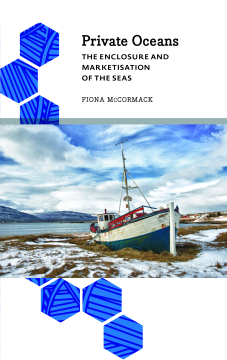
Additional Information
Book Details
Abstract
As the era of thriving, small-scale fishing communities continues to wane across waters that once teamed with (a way of) life, Fiona McCormack opens a window into contemporary fisheries quota systems, laying bare how neoliberalism has entangled itself in our approach to environmental management.
Grounded in fieldwork in New Zealand, Iceland, Ireland and Hawaii, McCormack offers up a comparative analysis of the mechanisms driving the transformations unleashed by a new era of ocean grabbing. Exploring the processes of privatisation in ecosystem services, Private Oceans traces how value has been repositioned in the market, away from productive activities. The result? The demise of the small-scale sector, the collapse of fishing communities, cultural loss, and the emergence of a newly propertied class of producers - the armchair fisherman.
Ultimately, Private Oceans demonstrates that the deviations from the capitalist norm explored in this book offer grounds for the reimagining of both fisheries economies and broader environmental systems.
'Essential reading ... an outstanding scholarly critique of a governance panacea paradigm, which consists of closing access to the marine commons, and the complex and transformative social impacts associated with the introduction of private property rights into coastal communities, and the handling of marketised fish quotas to a privileged few'
Niels Einarsson, Director of the Stefansson Arctic Institute, Akureyri, Iceland
'Provides an illuminating critique of the destruction wrought on precarious fishing communities and endangered fish species by the neoliberalisation of the oceans'
Jon Altman, Research Professor, Alfred Deakin Institute for Citizenship and Globalisation, Melbourne and Emeritus Professor in Anthropology, at The Australian National University Canberra
'This comprehensive analysis explores the linkages between the failure of late capitalism and the rise of neoliberalism in four countries' fisheries. Wonderfully combining political ecology and economy, McCormack's anthropological gaze also illuminates how resistance often followed neoliberal attempts to shape local cultural understandings of fishing and oceans'
Evelyn Pinkerton, School of Resource and Environmental Management, Simon Fraser University
Table of Contents
| Section Title | Page | Action | Price |
|---|---|---|---|
| Cover | Cover | ||
| Contents | v | ||
| Series Preface | vi | ||
| Acknowledgements | vii | ||
| Abbreviations | viii | ||
| Glossary | x | ||
| Introduction: Neoliberalising the Environment - the Case of Fisheries Quota | 1 | ||
| 1. Disciplining and Incorporating Dissent: Neoliberalism and Indigeneity | 20 | ||
| 2. Sustainability: A Malleable Concept | 49 | ||
| 3. Transferability and Markets | 75 | ||
| 4. Gifts and Commodities: Hawaiian Fisheries | 99 | ||
| 5. Nostalgia: Laments and Precarity | 124 | ||
| Epilogue: ITQs, Neoliberalism and the Anthropocene | 146 | ||
| Notes | 155 | ||
| Bibliography | 161 | ||
| Index | 180 |
